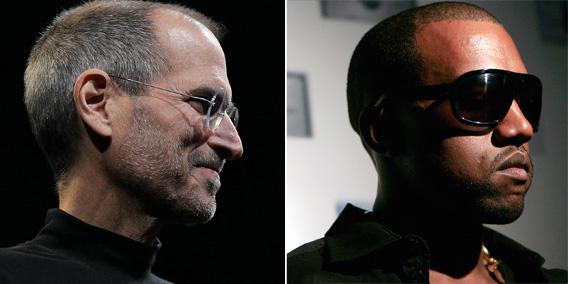On Tuesday, the New York Times published Jon Caramanica’s whirlwind of an interview with Kanye West. Among the hip-hop superstar’s many quotable remarks, one line of thinking stood out in particular for me: the comparison he made between himself and Apple’s late CEO, Steve Jobs.
West initially praises Jobs’ integrity, saying, “I would hear stories about Steve Jobs and feel like he was at 100 percent exactly what he wanted to do, but I’m sure even a Steve Jobs has compromised. Even a Rick Owens has compromised. You know, even a Kanye West has compromised.” Later in the interview, still speaking in the third person, West says, “I think what Kanye West is going to mean is something similar to what Steve Jobs means. I am undoubtedly, you know, Steve of Internet, downtown, fashion, culture. Period. By a long jump. I honestly feel that because Steve has passed, you know, it’s like when Biggie passed and Jay-Z was allowed to become Jay-Z.”
This is not the first time West has cited Jobs as an inspiration: In a series of tweets honoring the one-year anniversary of Jobs’ death, West called him “one of the most inspiring and influential human beings of our existence.” And while West’s comparison of himself with Jobs might seem easy to dismiss as another ridiculous Kanye moment, there’s actually something to it. West and Jobs really are kindred spirits with comparable worldviews who happen to have chosen different mediums to work in.
For West, making music is akin to solving a design problem, and he sees himself as a designer who’s up for the challenge: “Like I say,” he told Caramanica, “I’m a minimalist in a rapper’s body.” His new album, Yeezus, represents a full-on embrace of a Jobs-esque approach to making music, what West refers to as “aspiration minimalism.” Jobs found revelatory moments in the design philosophy of Dieter Rams—who valued purity, simplicity, and honest integrity—and the products of the German company Braun. West says he looked to architecture and furniture for moments of insight. “You know, this one Corbusier lamp was like, my greatest inspiration,” he says, adding, “the Louvre would have a furniture exhibit, and I visited it like, five times, even privately.”
West and Jobs both practice their respective design with a confidence bordering on hubris. As Jobs so bluntly put it, “A lot of times, people don’t know what they want until you show it to them.” And yet both West and Jobs have experienced moments of dejection when those around them wouldn’t recognize the presence of a genius. In the mid-’90s, Jobs lamented, “You know, I’ve got a plan that could rescue Apple. I can’t say any more than that it’s the perfect product and the perfect strategy for Apple. But nobody there will listen to me.” Replace a few keywords and this could be one of West’s many rants about how people (specifically, critics) are not giving him his due.
In the interview, West assures us that he has no regrets—the very concept seems to make little sense to him. His Jobs-like tendency to speak bluntly has “led me to complete awesomeness at all times,” he says. “It’s only led me to awesome truth and awesomeness. Beauty, truth, awesomeness.” West and Jobs appear to endorse a similar metaphysics, one in which beauty and truth are one and out there in the world to be found; it’s their quest to find it and present it to us, the hungry masses. Perfection is the only stopping point. As West tweeted while announcing the creation of his design company DONDA (named for his late mother), “We can collectively effect [sic] the world trough [sic] design. We need to pick up where steve jobs left off.”
And Kanye may relate to Jobs for another reason: They’re both visionaries who are just trying to make badass Christmas presents for people to give each other. Millions of Americans have been delighted to find iPads and iPods and iPhones under the Christmas tree (or angered to find them not there). “If you don’t make Christmas presents, meaning making something that’s so emotionally connected to people,” West says, “don’t talk to me.”
